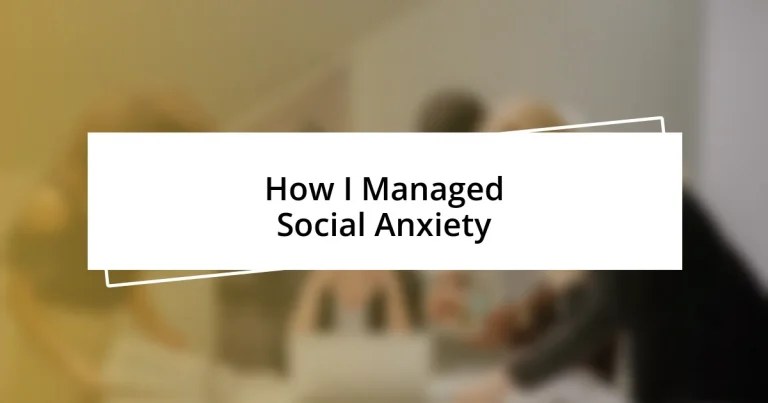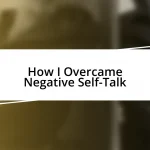Key takeaways:
- Understanding social anxiety involves recognizing its roots in fear and anticipation, which can lead to feelings of isolation and self-doubt.
- Developing effective coping strategies such as breathing techniques, cognitive restructuring, and gradual exposure can help manage anxiety and build confidence in social situations.
- Tracking progress and celebrating small victories, while incorporating mindfulness practices, fosters growth and resilience in overcoming social anxiety challenges.
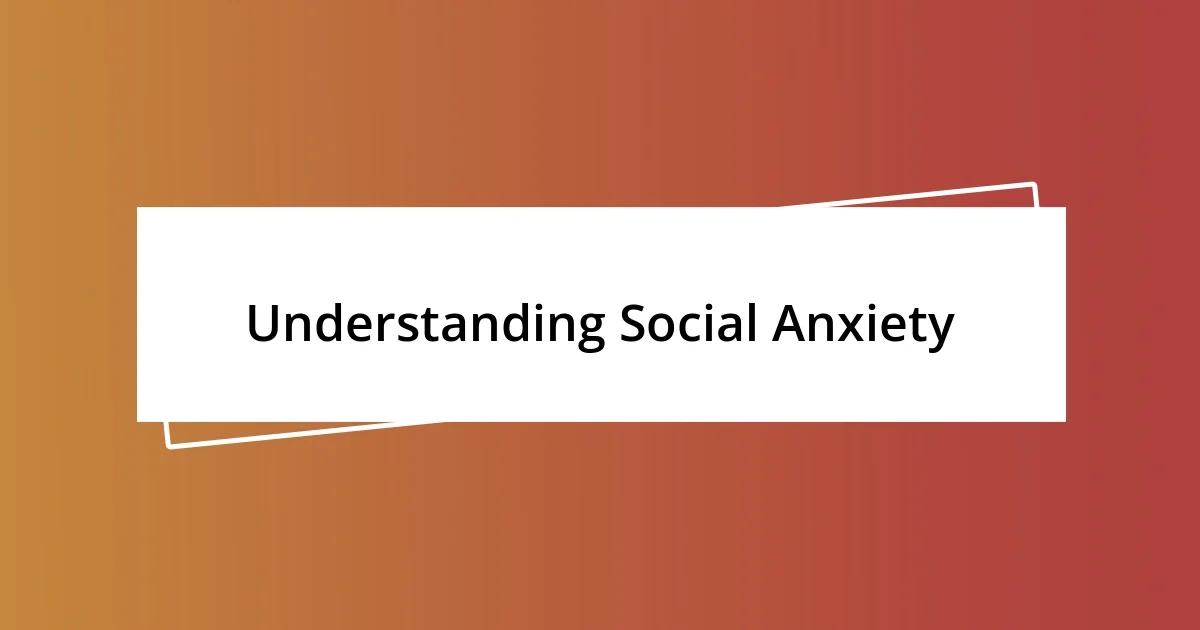
Understanding Social Anxiety
Social anxiety can feel like a heavy weight on your chest, squeezing tighter in social situations. I remember standing in a crowded room, my palms sweaty and my thoughts racing. Why does it feel so impossible to just blend in? It’s as if a spotlight is shining directly on me, exposing every fear of judgment I hold.
When I think about social anxiety, I realize it’s not just feeling shy; it’s an overwhelming fear of being scrutinized. How many times have I rehearsed a simple conversation in my head, only to stumble over my words when speaking? It’s frustrating to navigate everyday interactions caught in a whirlwind of self-doubt, which often leaves me feeling isolated, even in a crowd.
Understanding the impact of social anxiety often means recognizing its roots in fear and anticipation. I’ve had those nights where I lie awake, replaying my day, wishing I had been different, more confident. Why can’t the nervous feelings just disappear? Exploring this cycle has taught me that acknowledging these emotions is the first step to easing the burden.
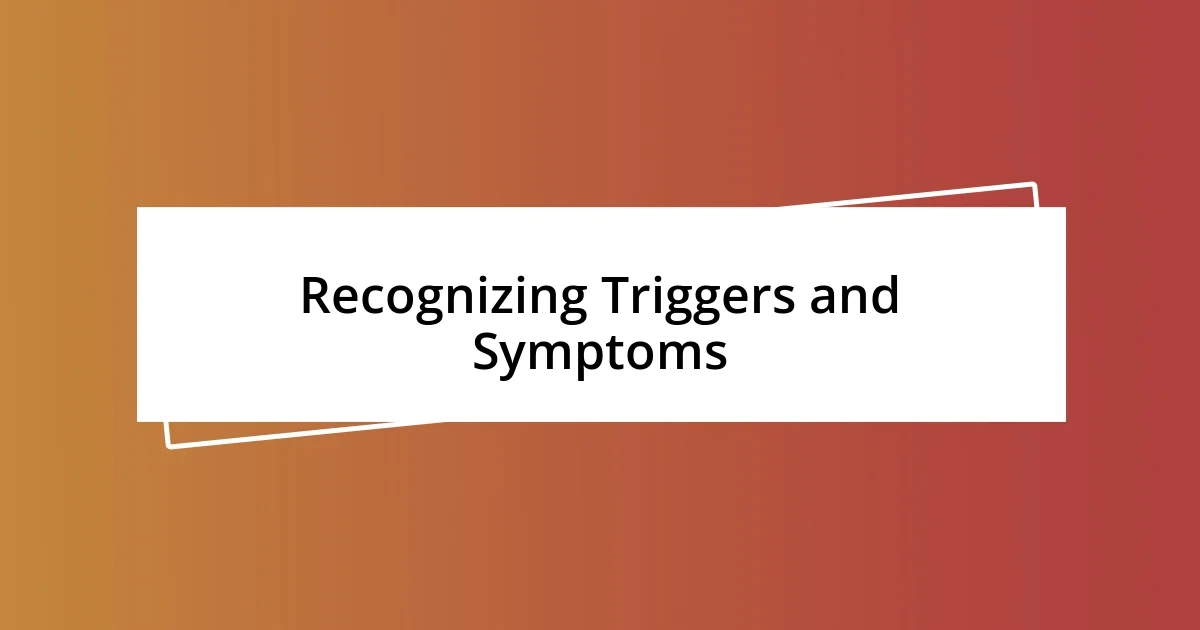
Recognizing Triggers and Symptoms
Recognizing triggers is crucial in managing social anxiety. For me, certain situations like parties or meetings could send my anxiety spiraling. Every time I approached a social gathering, my heart would race, and that familiar knot formed in my stomach, signaling that something was amiss. I learned to pinpoint what specifically triggered these feelings—was it the fear of being judged, or perhaps the unpredictability of interactions?
Here are some common triggers I’ve identified:
- Large Crowds: The volume and energy of numerous people can feel overwhelming.
- Unfamiliar Faces: New environments can heighten feelings of insecurity.
- Public Speaking: The idea of addressing others makes the anxiety surge.
- Social Media Interactions: The pressure to portray a perfect image online can be stressful.
- Waiting for Responses: The discomfort while waiting for replies in conversations can amplify worries.
By recognizing these triggers, I began to approach them with more awareness, gradually desensitizing myself to the situations that once seemed insurmountable. It’s a slow process, but reflecting on these moments has been enlightening and empowering.
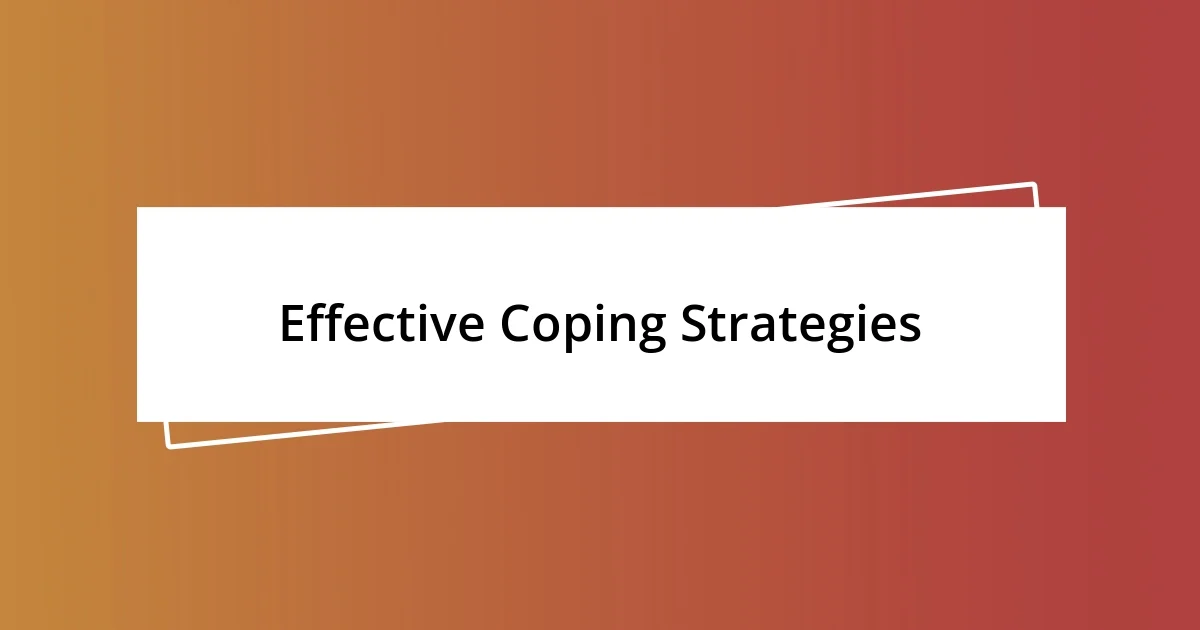
Effective Coping Strategies
Finding effective coping strategies has been a game changer for me. One method that truly resonated was breathing techniques. Whenever I feel my anxiety escalating in social situations, I focus on slow, deep breaths. A simple exercise involves inhaling deeply for a count of four, holding for four, and exhaling for six. This practice not only calms my nerves, but it also gives me a moment to collect my thoughts. Do you ever notice how just a few deep breaths can shift your perspective?
Another strategy that I found particularly useful is cognitive restructuring. I often catch myself spiraling with negative thoughts, questioning if I said something silly or worrying about how I was perceived. By actively challenging these thoughts, I replace them with affirmations. For instance, reminding myself that everyone makes mistakes helps me to regain confidence. This shift has made a world of difference in my interactions.
I also started to incorporate gradual exposure to challenging social situations. Initially, I would practice small conversations with a friend or chat with a cashier. Over time, I increased the complexity of these interactions. This slow exposure not only built my confidence but also revealed that many of my fears were unfounded. Each victory, no matter how small, reminded me that I’m capable of navigating social spaces.
| Strategy | Description |
|---|---|
| Breathing Techniques | Focus on slow, deep breathing to manage anxiety in the moment. |
| Cognitive Restructuring | Challenge negative thoughts and replace them with positive affirmations. |
| Gradual Exposure | Practice small conversations in low-pressure situations, then gradually increase complexity. |
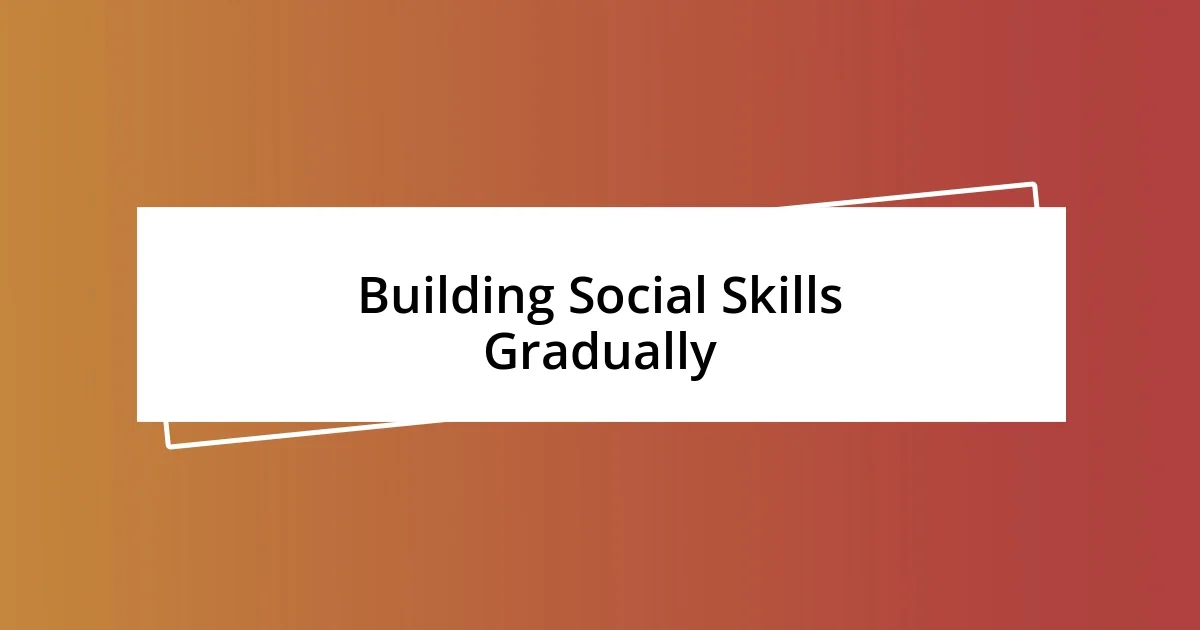
Building Social Skills Gradually
Building social skills gradually has been one of the most effective approaches for me. Early on, I struggled with initiating conversations. I remember standing in line at coffee shops, heart racing, battling the urge to just stay quiet. It was only after a few fleeting attempts that I decided to challenge myself by asking the barista about a new menu item. What surprised me was how a small interaction not only calmed my nerves but also sparked a sense of satisfaction that made me want to try again.
As I continued to practice, I expanded beyond just the barista. I set small, manageable goals, such as smiling at strangers or saying “hello” to neighbors. Each positive experience added a piece to my confidence puzzle. Have you ever noticed how little wins can energize your spirit? For me, those moments began to feel less daunting, and I started realizing that people generally respond warmly to simple gestures.
This gradual exposure taught me that building social skills is less about perfection and more about connection. I recall feeling a sense of accomplishment after engaging in a short conversation with a colleague I barely knew. It was a small step, yet it felt monumental at the time. Each enchanting interaction left me reflecting on how the fear I’d constructed was often far worse than reality. By embracing these experiences, I’ve learned that the journey is just as important as the goal.
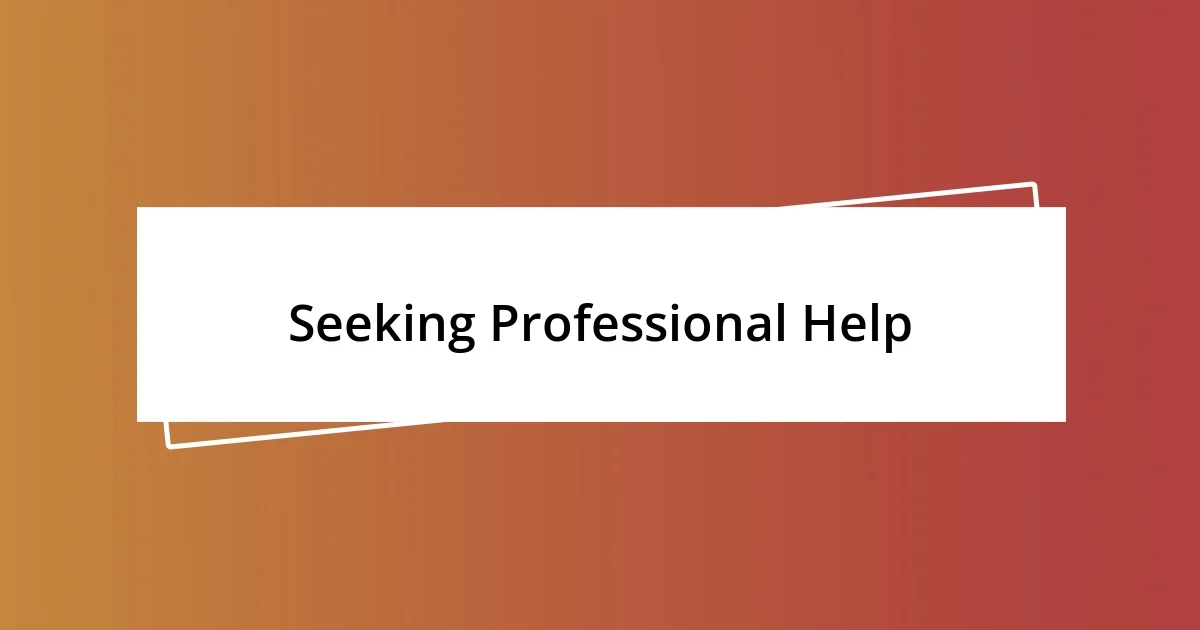
Seeking Professional Help
Seeking professional help was a pivotal moment in my journey with social anxiety. After countless instances of feeling overwhelmed in social settings, I reached out to a therapist who specialized in anxiety disorders. I remember the first session vividly; it was nerve-wracking to share my fears, yet the therapist’s empathetic approach made me feel understood. Have you ever felt like just talking to someone can lighten the emotional load? That’s exactly what happened for me.
Throughout therapy, I learned about different methods to cope and manage my anxiety. One technique that struck a chord with me was exposure therapy, where we gradually faced my fears in a safe environment. It felt like I was peeling back layers of anxiety, revealing a more confident version of myself underneath. I often reflect on how terrifying those first few steps were—yet surprisingly liberating at the same time.
Moreover, medication was discussed as a potential support tool. Initially, I was hesitant to consider it. However, I realized that some medical professionals could provide a balanced perspective on the benefits and risks. Eventually, I approached it with an open mindset. This multifaceted approach allowed me to find strategies tailored to my experiences, making it a deeply personal and transformative process. Isn’t it reassuring to think that, sometimes, a blend of therapy and medication can create a clearer path toward healing?
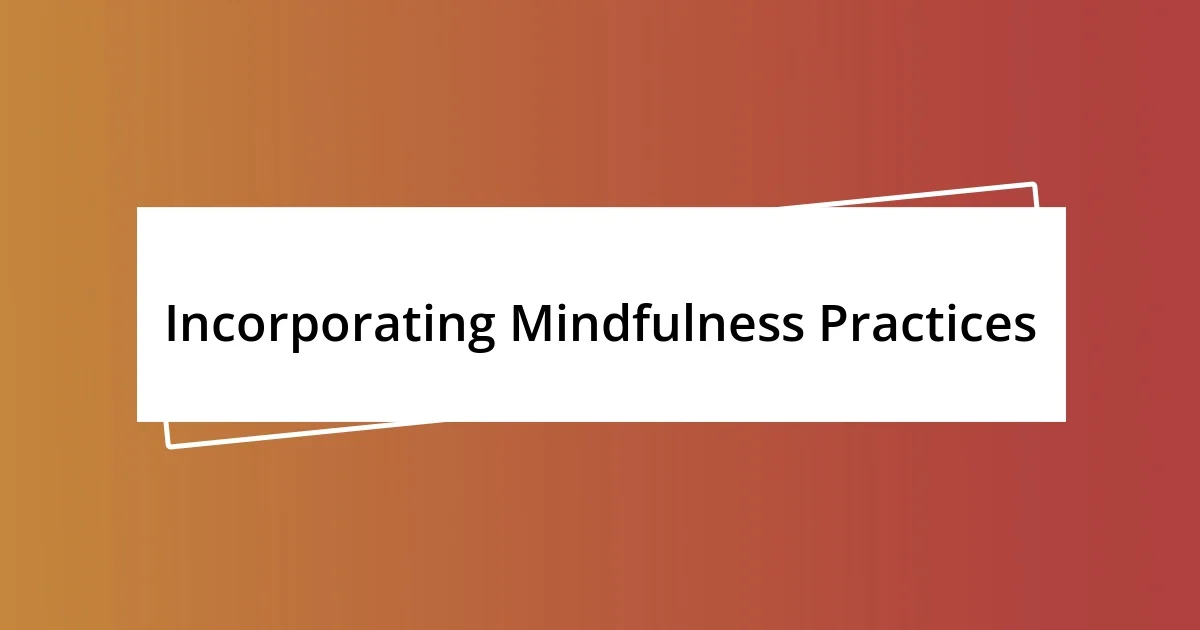
Incorporating Mindfulness Practices
Incorporating Mindfulness Practices
Incorporating mindfulness practices into my daily routine has proven to be a game changer in managing my social anxiety. I vividly remember my first attempt at mindfulness meditation; I sat cross-legged on my bedroom floor, surrounded by silence. At first, my thoughts raced a mile a minute—was I doing it right? But with persistence, I learned to observe those racing thoughts without judgment. Have you ever noticed how just a few deep breaths can create a sense of calm? That’s what mindfulness began to do for me; it allowed me to be present and reduce the overwhelming noise in my mind.
As I embraced mindfulness, I started integrating it into various moments throughout my day. Walking became a practice in itself; instead of getting lost in anxious thoughts about social interactions, I focused on the rhythm of my feet hitting the ground and the sounds of nature around me. It was surprisingly grounding. This practice reminded me that the world is at my fingertips, and it’s okay to take things one step at a time. Have you ever felt overwhelmed by your surroundings? Mindfulness helped me sift through that noise, creating pockets of peace even in crowded spaces.
I also experimented with mindful breathing techniques before social events. Just taking a moment to inhale slowly and exhale any tension made a noticeable difference in how I approached interactions. I recall a particularly daunting gathering where I felt the weight of social expectations. Instead of succumbing to panic, I found a quiet corner and focused on breathing. Suddenly, the world felt less intimidating. It’s incredible how something as simple as breathing can rearrange the way we perceive anxiety. Have you tried it? If not, I wholeheartedly encourage you to give it a shot—what’s the worst that could happen? You might just find a new ally in your journey towards embracing social situations.
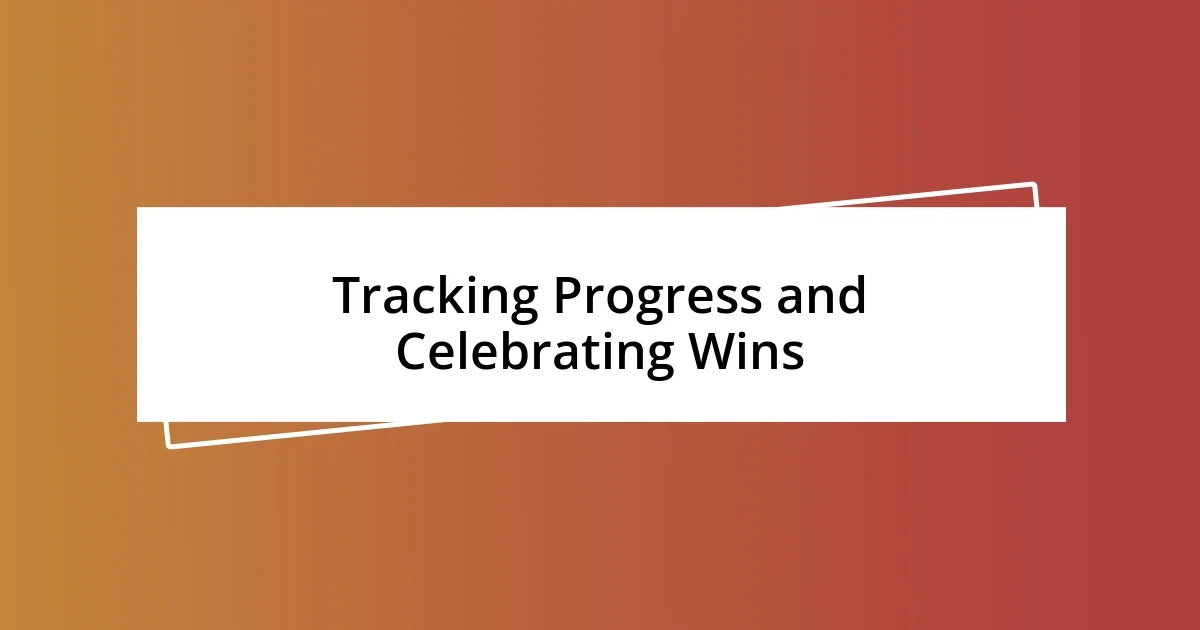
Tracking Progress and Celebrating Wins
Tracking progress and celebrating wins is crucial when managing social anxiety. I remember the first time I confidently spoke up during a group discussion at work. It felt like climbing a mountain, and afterward, I couldn’t help but celebrate that small victory. Have you ever experienced a moment where everything came together, and you realized just how far you’ve come? That sense of accomplishment is so empowering, and it encourages you to keep pushing forward.
I found keeping a journal really helpful in recognizing my progress. Each entry was like a snapshot of my journey, showcasing moments of growth that I might have otherwise overlooked. For instance, one week, I wrote about handling a large gathering without my heart racing like a drum—such a simple, yet monumental step. Reflecting on these moments created a sense of gratitude, reminding me that every little win contributes to the bigger picture. How invaluable is it to see one’s own growth laid out in writing? It’s nothing short of motivating.
Celebrating these wins doesn’t have to be extravagant. Sometimes, I treat myself to a cozy evening with my favorite book or a special meal; it’s my way of honoring my efforts. I discovered that even small acknowledgments can serve as fuel for the next challenge. When was the last time you celebrated a small victory? I encourage you to take a moment, appreciate your journey, and recognize just how far you’ve come. It’s those little joys that build a resilient spirit, ready to tackle whatever comes next.












